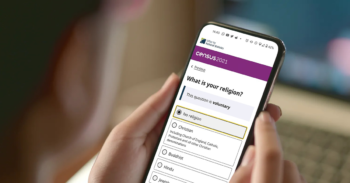
If you’re not religious, say so! We’re encouraging people to tick the ‘no religion’ option on the 2021 Census. Below you can find out more about one aspect of this campaign.
Pledge to tick ‘no religion’ ✅
We strongly recommend that if you are not religious in your beliefs or practices, then no matter what terms you normally use to describe yourself, you tick the ‘No religion’ box on the Census (or ‘None’ if you are in Northern Ireland). Ticking ‘No religion’ is better than writing in another answer under the ‘Other religion’ box (or not answering at all) because in doing so you will help show the true number of those with no religion.
This is because the Census is a mass data gathering exercise. It is interested in gathering broad information about the makeup of the population to influence policy decisions at both the local and national level. Consequently, groups who lobby against rights for the non-religious sometimes cherry-pick statistics for particular terms like ‘humanist’ and ‘atheist’ to dilute the numbers of non-religious people recorded in the population and therefore marginalise calls for greater secularism and inclusivity in our society.
For example, NHS trusts and prisons have used Census data to block the recruitment of non-religious pastoral carers. The bodies that set RE syllabuses at the local level have done likewise to block non-religious representation on them or in the curriculum. They do this by citing the small number of ‘atheists’ or ‘humanists’ recorded in the Census. They claim that the very low number of atheists or humanists recorded show that there are almost no atheists or humanists – when in fact this is wrong because almost all atheists or humanists tick ‘No religion’, and in nearly all settings the non-religious are either the largest or second largest belief group.
Lord Cormack, speaking in the House of Lords in 2011, illustrated this approach:
‘In the 2001 census, over 70 per cent of people in the country said that they considered themselves to be Christian, whereas fewer than 20,000 said that they were atheists. We do have a duty to expose our young people to what I consider to be the truths of the Christian religion but what we must all consider to be the bedrock of our civilisation.’
An alternative approach would of course be for us to try to maximise the number of people who write in ‘atheist’, ‘agnostic’, ‘humanist’, and so on, but this plainly wouldn’t work, first because of the overlapping nature of the options – people could fall under any or all of these labels, as well as ‘No religion’ – and secondly because the box you then must tick is ‘Other religion’, and clearly most non-religious people will not tick that box. The best way to prevent a divided response is therefore to tick ‘No religion’.
In practice, then, writing anything under the ‘Other religion’ box – rather than ticking the ‘No religion’ box – will effectively mean that your answer will count for less.
